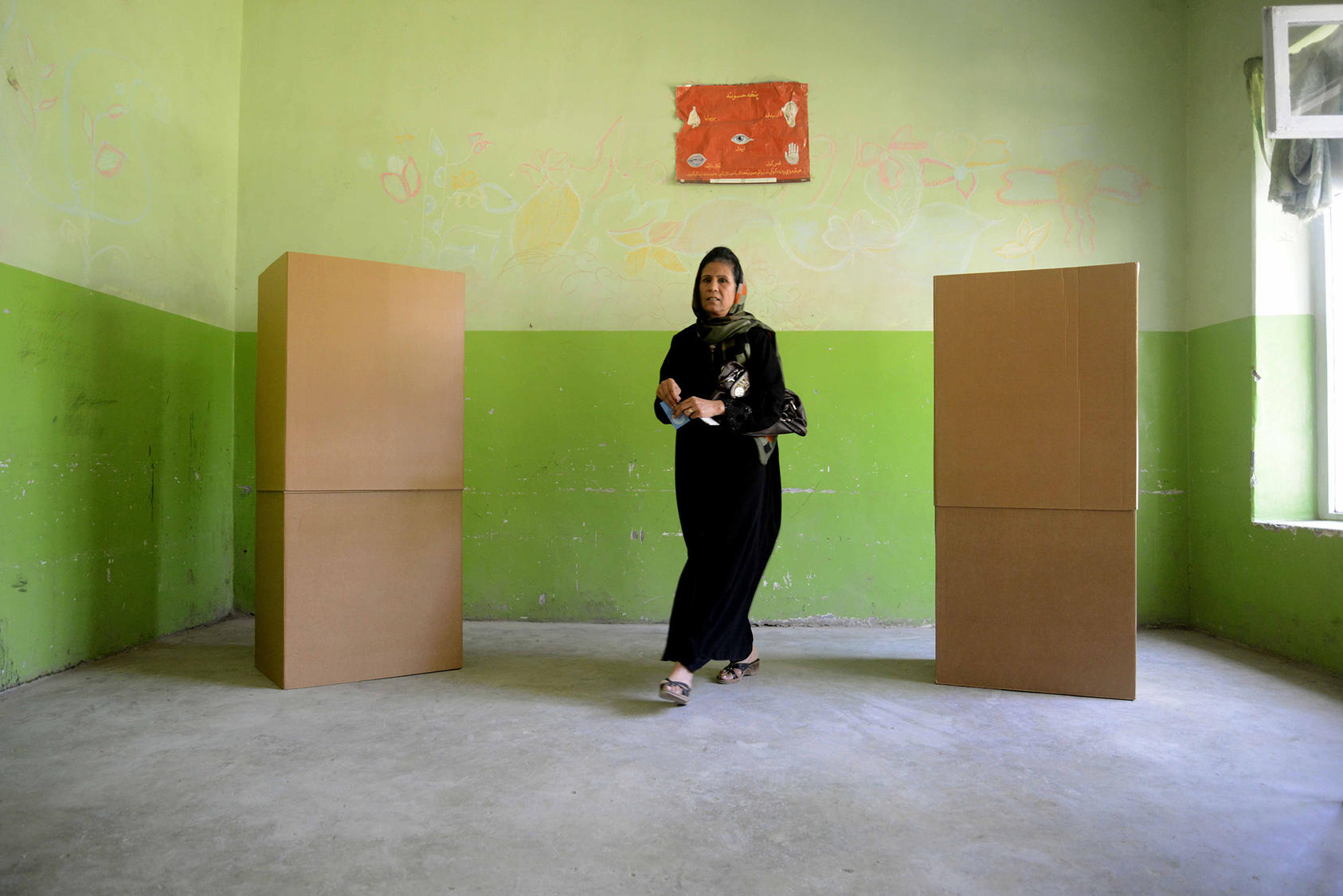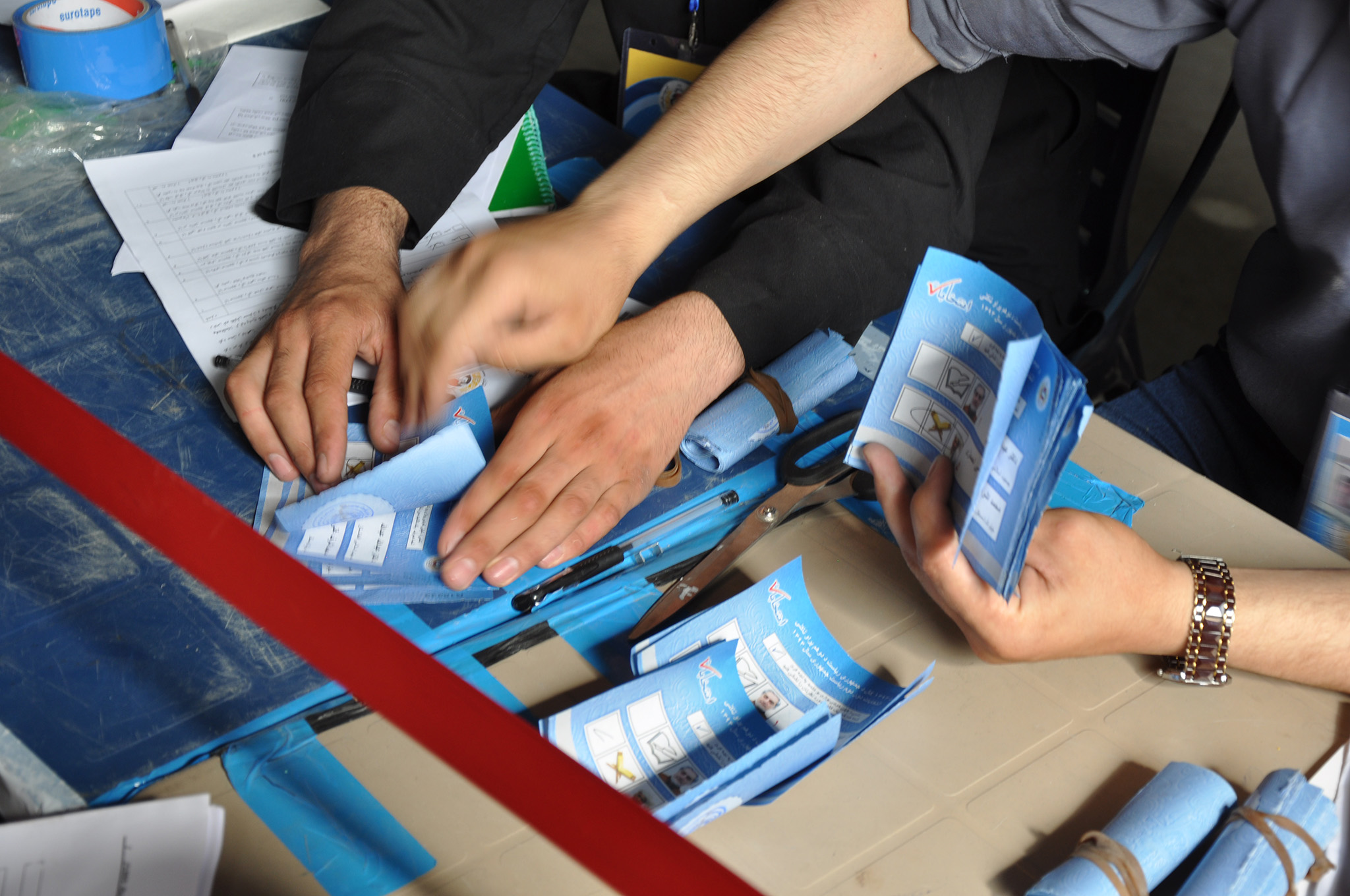Afghanistan Still Has a Chance to Improve This Election
Last year’s vote was tainted by crimes. Authorities could show the will to prosecute them.
As the United States, the Afghan government and the Taliban maneuver toward a peace process for the country, the strength of the current Afghan government and political system will be affected by the credibility, in Afghans’ eyes, of the presidential election set for September 28. Yet the credibility of Afghan elections is weakened by unresolved allegations of criminal fraud—especially against the nation’s former top election officials—in last year’s parliamentary balloting. With just 53 days remaining before the presidential vote, time is now short—but Afghan authorities still can take steps to improve the prospects for an election that citizens might see as credible and legitimate.

Some key steps to strengthen accountability in next month’s presidential vote could come from three institutions: the Attorney General’s Office, the Electoral Complaints Commission, and in particular, a special court called the Anti-Corruption Justice Center. While these bodies all face problems of capacity and Afghan interagency coordination, each could improve the climate for this critical election with an act of political will.
The 2018 Vote: An Obstacle to Credibility
The challenge facing this election was dramatized by the last one. In October, Afghans elected a parliament under a new penal code intended to reduce corruption, including election crimes. But thousands of complaints—of rigged election counts, bribery and other fraud—emerged. Four months later, with that election’s results still not finalized by the nation’s Independent Election Commission, the government fired all 12 members of that body and the national Election Complaints Commission, and subsequently indicted them for election fraud.
The authorities’ ability to prosecute past electoral crimes, and thus to deter future ones, is constricted by a mix of insufficient capacity, poor coordination, a flawed electoral code and a public perception that manipulation of elections goes unpunished.
Of nearly 20,000 allegations by citizens of electoral fraud in October’s election, the Attorney General’s Office has prosecuted about 130 cases. But even where convictions were won, the authorities have made minimal effort to publicize them for their deterrent impact. Meanwhile, the Afghan public sees clearly that election corruption at the highest levels of governance is going unpunished: the indictments of the dismissed election commissioners are stalled in a dispute over which court should try them.
The new Afghan penal code aims to strengthen deterrence by defining specific electoral offenses as crimes. This is critical in Afghanistan, where contested election results and challenges to the integrity of electoral processes have led to threats of violence and secession in the past. Yet the improved law remains flawed. For example, it established lighter punishment for election-related bribes than for other bribery of public officials.
Problems with the Process
Government rules let citizens report crimes to local offices of the Electoral Complaints Commission (or ECC), and are designed to funnel them directly to officials with the power to prosecute. Local ECC staff must investigate, analyze whether a crime or a lesser violation has been committed, and forward reports to the Attorney General’s Office for further investigation and trial. The process faltered last year largely because the ECC had planned for only about half of the nearly 20,000 allegations it received from citizens—reports of ballot-box stuffing, selling of votes, underage voting, and more.
The government’s February dismissal of election officials removed all ECC commissioners, along with their counterparts at the Independent Election Commission, which supervises all elections. Unsurprisingly, the subsequent period of disarray in the ECC stalled its investigation and prosecution of the electoral fraud cases.
Officials in the Attorney General’s Office said the stall in the central operations of the ECC was a particular problem. The attorney general’s prosecutors were receiving information on potential crimes from provincial ECC offices, security forces, politicians, and other people—many of them too inconsistent or incomplete to open a criminal investigation. But it was not getting the fuller analyses and clarification it needed from the central Electoral Complaints Commission that could have filled the gaps in information and led to indictments.
Besides the delays, the investigation process suffered from uncertainties in the delineation of responsibilities between the ECC and the Attorney General’s Office. Some reports were sent incomplete, without the necessary ECC analysis, to the attorney general’s office for action. Further, officials with the Attorney General’s Office indicated that ECC staff are uncertain about the standards that such reports must meet if they are to enable the opening of criminal investigations.
A Standoff Between Courts
Even for cases that made it through the much-delayed reporting, analysis and investigation procedures, actual prosecution in a court has been stalled in part because no law clearly identifies which courts can try election crimes—including charges against political elites. That includes cases against the election commissioners fired in February.
The Attorney General’s Office planned to bring these commissioners’ cases before the Anti-Corruption Justice Center—a special court established by the coalition government of President Ashraf Ghani as a reliably independent body to try politically difficult cases. The Center is tasked explicitly with handling corruption charges against high-ranking officials such as deputy ministers or governors, or allegations of malfeasance involving money in excess of $7,500. While the center has convicted some senior officials, both the U.S. Special Inspector General for Afghanistan Reconstruction last year and the U.N. mission in Afghanistan this year have reported concerns over its efficacy, noting that many of its cases were tried in absentia, and many of those charged or convicted never physically arrested.
A representative of the attorney general’s office said in an interview that the center refused to take the election commissioners’ cases, arguing that it had no jurisdiction over the chapter in the Penal Code that deals with election crimes. Despite a Supreme Court ruling in June that the Anti-Corruption Justice Center does indeed have jurisdiction over commissioner cases, the center has not acted.
Even where the Attorney General’s Office has prosecuted lower-profile election crimes, it has failed to communicate this prominently. The few announcements of convictions crucially have failed to say whether prison sentences are actually being carried out or fines collected. Thus virtually no evidence has emerged to the Afghan public of legal consequences for undermining the integrity of elections. The stalled prosecution of commissioners dominates media attention, delivers the opposite message—that accountability is unachieved.
Progress is Possible
With 53 days left before the presidential vote, the ECC and the Attorney General’s Office still could take steps to improve its transparency and integrity:
- The Attorney General’s Office could provide guidelines, a template, and training to ECC staff and others, to standardize future reports of election crimes. Proactive guidance could reduce the delays seen in the past.
- An urgent, though more difficult, task is added training for the ECC’s local investigative staff to speed their processing of reported violations. Offering examples from those cases prosecuted from the 2018 parliamentary elections could help.
- The Attorney General’s Office could work with the election commissions and media to publicize the public about successful prosecutions of crimes during the parliamentary election.
- The Attorney General’s Office and ECC should more clearly delineate their respective roles in investigating and analyzing election crimes. The two organs could draw lessons from the parliamentary elections to improve on the formal memoranda of understanding that currently govern their joint work.
- Critically, given the high profile of the indictments against the nation’s formerly senior-most election officials, the judicial system should reach consensus on which court will try them. The Supreme Court has declared that the Anti-Corruption Justice Center should do so, and the Attorney General’s Office formally asked the center to proceed to trials. As Afghans decide in coming weeks whether to vote in September—and as they judge the election’s legitimacy—they are sure to notice whether steps have been taken to prosecute last year’s election fraud cases.
Chelsea Dreher is a USIP program specialist; Ezatullah Waqar is a program manager for USIP in Afghanistan.




